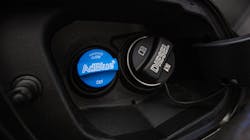Noregon Tech Tips: When to test Diesel Exhaust Fluid (DEF)
It’s essential to always ensure your diesel exhaust fluid (DEF) adheres to quality standards, which is why Noregon Systems recently released tips to help technicians understand the best method and timeline for their assets. In the proper conditions with accurate storage temperature and avoiding direct sunlight, DEF has a minimum shelf life of 18 months. To verify your DEF’s quality, it’s crucial to know when to test because if not, the engine will derate.
Technicians can use various methods to test DEF quality, such as a refractometer, where you take a sample of the DEF, place it on the sight glass, close the lid, and hold it up to the light. Ideally, you expect to be at a level of 32.5%. Another test option is putting test strips in the DEF tank. Test strips are the most cost-effective and easiest test solution for technicians. If the strip stays the same color, the DEF is in good shape.
There are a few indicators that a technician should test DEF quality, including:
- Fault code(s) indicate poor DEF quality. An engine light will typically appear, and technicians should test DEF and perform a comprehensive diagnosis of the aftertreatment system.
- A vehicle sat for an extended period of time. If your fleet has a truck experiencing longer downtime, you may want to test DEF before dispatching the vehicle, as DEF can reach temps over 160 degrees, shortening the lifespan.
- DEF has a noticeable odor. Typically, DEF may have a slight ammonia or sulfur smell, but a noticeable, pungent scent could indicate poor quality. When testing, technicians should smell the DEF tank to ensure there isn’t cross-contamination.
Read more: The determining factors for powertrain fluid maintenance intervals
Overall, the interval for testing DEF quality will depend on factors such as the vehicle’s usage, operating conditions, and manufacturer recommendations. Technicians shouldn’t wait for other signs that the DEF has gone bad.
To summarize, diesel exhaust fluid (DEF) relies on technicians to test their levels, ensuring good quality. By giving technicians an easy-to-follow preventative maintenance checklist and pairing it with an all-makes/models application to check what he or she cannot see, fleets will meet EPA mandates, avoid costly breakdowns, and positively impact society.
